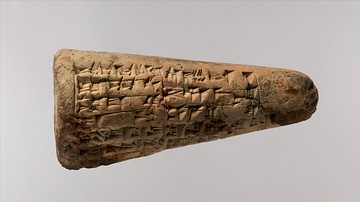Search
Did you mean: Timur?
Search Results

Video
The Poor Man of Nippur - World's first film in Babylonian
"The Poor Man of Nippur" is a c. 3,000-year-old comic folk tale in Babylonian language. The main manuscript is a clay tablet from 701 BC found at the site of Sultantepe, in South-East Turkey. Recounted by a third-party narrator, it tells...

Article
Mesopotamian Education - Creating the First Written Works in History
Mesopotamian education was invented by the Sumerians following the creation of writing circa 3600/3500 BCE. The earliest schools were attached to temples, but later schools were established in separate buildings, in which the scribes of ancient...

Article
Enlil in the E-kur
Enlil in the E-Kur (c. 2000 BCE) is a Sumerian hymn praising the sky god Enlil, his temple/ziggurat at Nippur, and his consort Ninlil, depicting all three in glowing terms and Enlil as a creator-god. The piece is highly regarded as an important...

Definition
Enlil
Enlil (also known as Ellil and Nunamnir) was the Sumerian god of the air in the Mesopotamian Pantheon but was more powerful than any other elemental deities and eventually was worshiped as King of the Gods. He is featured in a number of important...

Definition
Shulgi of Ur
Shulgi of Ur (r. 2029-1982 BCE) is considered the greatest king of the Ur III Period in Mesopotamia (2047-1750 BCE). His father was Ur-Nammu (r.2047-2030 BCE), who founded the Third Dynasty of Ur, and his mother was a daughter of King Utu-Hegal...

Article
A Praise Poem of Lipit-Estar
A Praise Poem of Lipit-Estar is a Sumerian praise song honoring Lipit-Estar (also known as Lipit-Ishtar, r. c. 1870 to c. 1860 BCE), the fifth king of the First Dynasty of Isin, best known for his legal code written between the time of the...

Article
A Praise Poem of Shulgi
A Praise Poem of Shulgi (c. 2020-2000 BCE) is an ancient Sumerian document celebrating the famous run of 200 miles (321.8 km) in one day made by the king Shulgi of Ur (r. 2029-1982 BCE) to distinguish his reign by officiating at the religious...

Definition
Mesopotamian Religion - Daily Life as a Form of Worship
Mesopotamian religion was central to the people's lives. Humans were created as co-laborers with their gods to hold off the forces of chaos and to keep the world running smoothly. As in ancient Egypt, the gods were honored daily for providing...

Definition
Eridu Genesis
The Sumerian Flood Story (also known as the Eridu Genesis, The Flood Story, Sumerian Creation Myth, Sumerian Deluge Myth) is the oldest Mesopotamian text relating the tale of the Great Flood which would appear in later works such as the Atrahasis...

Definition
Akkad and the Akkadian Empire
Akkad was the seat of the Akkadian Empire (2334-2218 BCE), the first multi-national political entity in the world, founded by Sargon the Great (r. 2334-2279 BCE) who unified Mesopotamia under his rule and set the model for later Mesopotamian...